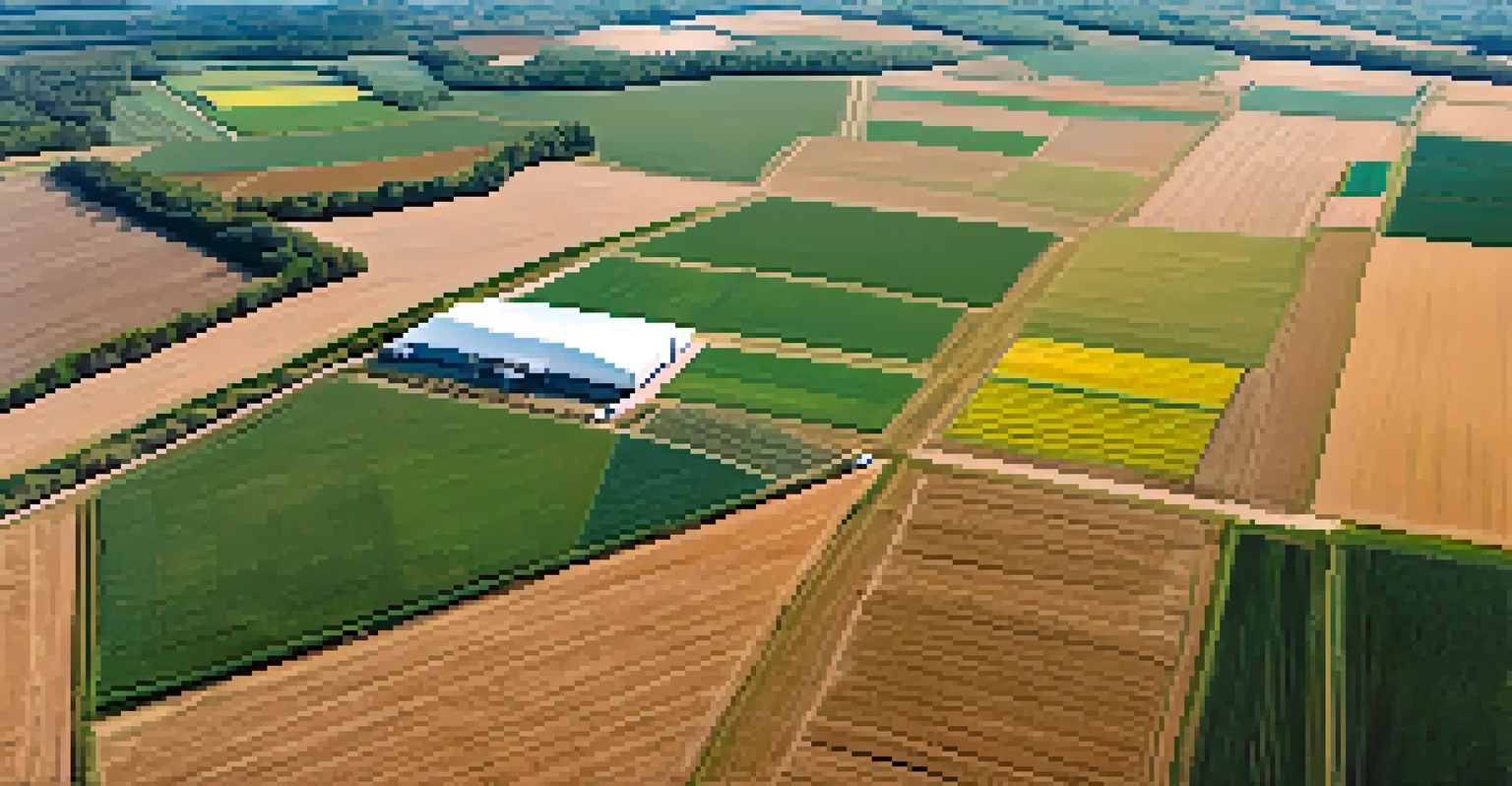Agriculture's Impact on Economic Growth in Georgia State

Agriculture: A Cornerstone of Georgia's Economy
Agriculture has long been a vital part of Georgia's economy, serving as a backbone for both rural and urban communities. With its diverse climate and fertile soil, the state is a leading producer of crops like peaches, peanuts, and cotton. This industry not only provides jobs but also supports related sectors, such as transportation and food processing, which further boosts economic activity.
Agriculture is the foundation of our economy and our way of life in Georgia.
In 2022 alone, Georgia's agricultural sector contributed over $75 billion to the state's economy, showcasing its significant impact. The state's agricultural exports play a crucial role in enhancing trade relationships and promoting economic stability. Without agriculture, many small towns would struggle to thrive, as local farmers and businesses rely heavily on this sector.
Moreover, agriculture in Georgia isn't just about production; it also fosters community development. Farmers' markets and agritourism initiatives provide unique opportunities for residents and visitors alike, creating a vibrant local culture. This interconnectedness highlights how agriculture is more than just a business; it's a community builder.
Job Creation Through Agricultural Practices
One of the most significant impacts of agriculture on Georgia's economy is job creation. The industry employs thousands of individuals, from farmers and laborers to researchers and marketers. These jobs are essential, particularly in rural areas where employment opportunities can be limited.

In addition to direct employment, agriculture indirectly supports a vast number of jobs in sectors like transportation, retail, and technology. For example, a single farm might require trucking services to deliver its produce, which in turn creates jobs for drivers and logistics personnel. This ripple effect underscores the importance of agriculture as a job engine for the entire state.
Agriculture Drives Georgia's Economy
Georgia's agricultural sector contributes over $75 billion to the economy, providing jobs and supporting related industries.
Furthermore, educational programs focused on agricultural sciences and sustainability are helping to prepare the next generation of agricultural professionals. By investing in training and education, Georgia is ensuring that its agricultural sector remains competitive and innovative, ultimately leading to further economic growth.
Technological Advancements in Georgia Agriculture
The integration of technology into agriculture is reshaping how farmers operate in Georgia. Innovations such as precision farming and data analytics allow farmers to optimize their resources and increase yields. This technological shift not only boosts productivity but also enhances the sustainability of farming practices.
Sustainable agriculture is a path to a better future for our farmers and our communities.
For instance, farmers are now using drones to monitor crop health and irrigation systems that conserve water while maximizing growth. These advancements not only contribute to economic growth by increasing efficiency but also address environmental concerns, making agriculture more sustainable. As these technologies become more widespread, the economic benefits are expected to grow.
Additionally, Georgia's universities and research institutions are at the forefront of agricultural innovation. By collaborating with farmers and businesses, they are developing solutions that tackle real-world challenges, ensuring that the state remains a leader in agricultural advancements.
The Role of Agribusiness in Economic Development
Agribusiness plays a crucial role in supporting Georgia's agricultural sector, acting as a bridge between producers and consumers. Companies involved in processing, distribution, and retail help to create a stable market for farmers' products. This interconnectedness is vital for ensuring that agricultural goods reach consumers efficiently.
Moreover, agribusiness fosters economic development by investing in local communities. Many agribusinesses are committed to sustainability and often support local initiatives, such as education and health programs. This investment not only benefits the community but also strengthens the agribusiness's operations by fostering goodwill and loyalty.
Sustainable Practices Boost Growth
Adopting sustainable farming methods enhances productivity while meeting the rising consumer demand for environmentally friendly products.
As Georgia continues to develop its agribusiness sector, the potential for economic growth expands. By creating a robust supply chain, agribusinesses enhance the resilience of the agricultural economy, ensuring that it can withstand market fluctuations and continue to thrive.
The Economic Impact of Sustainable Practices
Sustainable agricultural practices have gained traction in Georgia, with many farmers adopting methods that promote environmental health and economic viability. These practices often lead to reduced costs and increased efficiency, ultimately contributing to economic growth. By focusing on sustainability, farmers can minimize waste and maximize productivity.
For example, crop rotation and organic farming methods can enhance soil health and yield quality. As consumers become more environmentally conscious, the demand for sustainably sourced products is rising. This shift not only satisfies consumer preferences but also opens new market opportunities for Georgia's farmers, bolstering the economy.
Furthermore, sustainable farming practices can lead to new job opportunities in areas such as organic farming, conservation, and environmental management. By embracing sustainability, Georgia's agricultural sector can continue to evolve, ensuring long-term economic growth while protecting natural resources.
Challenges Facing Georgia's Agricultural Sector
Despite its strengths, Georgia's agricultural sector faces several challenges that could impact its economic growth. Issues such as climate change, market fluctuations, and labor shortages pose significant threats to farmers and businesses alike. These challenges require innovative solutions and collaboration among stakeholders to ensure the sector's resilience.
For instance, unpredictable weather patterns can affect crop yields and threaten food production. Farmers must adapt to these changes by investing in more resilient crop varieties and advanced irrigation systems. This adaptability is essential for maintaining Georgia's position as a leading agricultural state.
Technological Advances Transform Farming
Innovations like precision farming and data analytics are optimizing resources and increasing yields, contributing to economic growth.
Additionally, labor shortages in agriculture are a growing concern, particularly as many workers are aging or seeking employment in other sectors. To combat this, Georgia needs to attract a new generation of workers through education and outreach initiatives that highlight the opportunities within the agricultural field.
The Future of Agriculture and Economic Growth in Georgia
Looking ahead, the future of agriculture in Georgia appears promising, with numerous opportunities for growth and innovation. By investing in technology, sustainable practices, and education, the state can continue to enhance its agricultural productivity and economic impact. The collaboration between farmers, businesses, and educational institutions will be crucial in this journey.
As consumer preferences shift toward locally sourced and sustainable products, Georgia's farmers are well-positioned to meet this demand. This trend can lead to increased sales and economic growth, benefiting not only farmers but also the entire state economy. The potential for agritourism and local food initiatives can further enrich the economic landscape.

Ultimately, the ongoing commitment to supporting and evolving the agricultural sector will ensure that it remains a key driver of Georgia's economic growth. By addressing challenges and embracing opportunities, Georgia can cultivate a thriving agricultural landscape for generations to come.